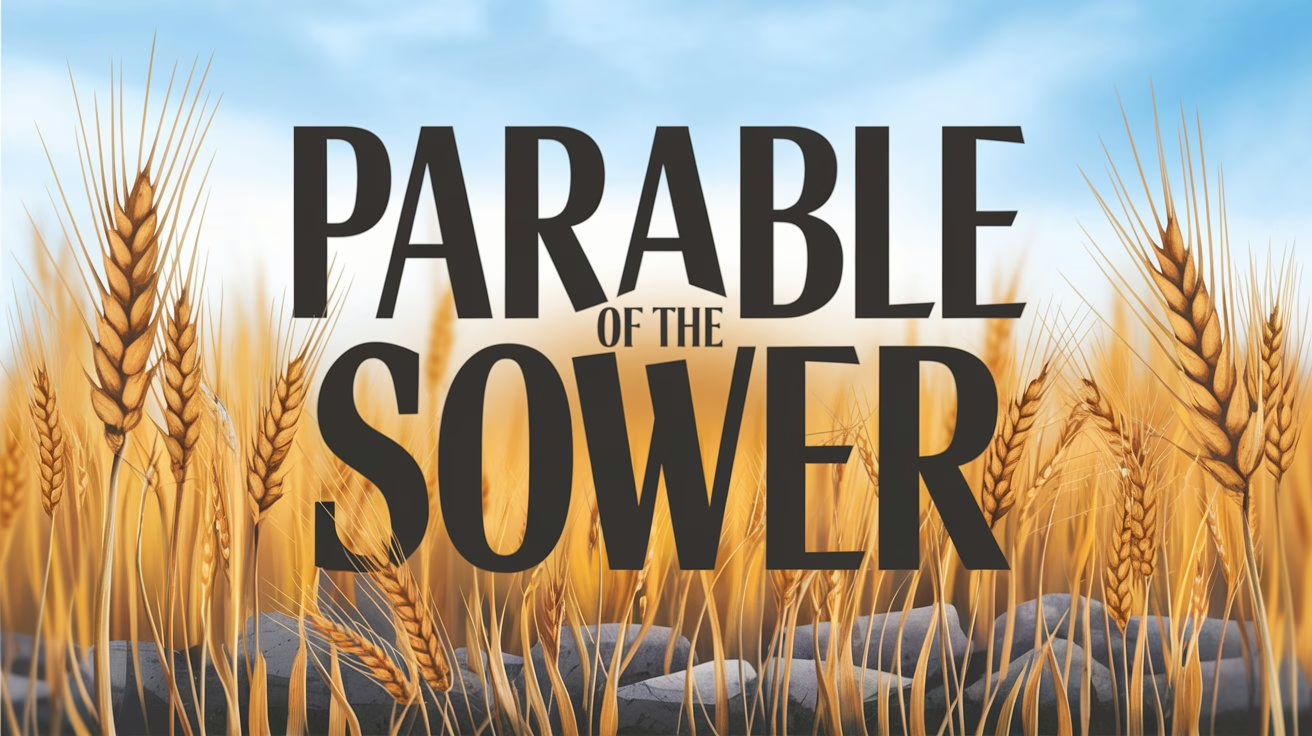The Parable of the Sower is one of the most well-known teachings of Jesus and provides a profound insight into the kingdom of heaven, the human heart, and the response to the gospel. This parable, found in Matthew 13:1-23, Mark 4:1-20, and Luke 8:4-15, is unique because Jesus not only tells the parable but also gives us its interpretation, revealing the spiritual truths hidden within the story.
Why Did Jesus Teach in Parables?
Before diving into the parable itself, it’s important to understand why Jesus often used parables in His teachings. Parables are simple stories that convey deeper spiritual truths. Jesus used them to both reveal and conceal truth—revealing it to those with open hearts while concealing it from those who were spiritually blind or hardened.
Matthew 13:13-15 (NKJV): “Therefore I speak to them in parables, because seeing they do not see, and hearing they do not hear, nor do they understand. And in them the prophecy of Isaiah is fulfilled, which says: ‘Hearing you will hear and shall not understand, and seeing you will see and not perceive; for the hearts of this people have grown dull.’”
Jesus spoke in parables to draw in those who were genuinely seeking truth while allowing those who were hardened to remain in their self-chosen blindness. The parable of the sower is a perfect example of this, as it speaks directly to the condition of the heart and how individuals respond to God’s Word.
The Parable of the Sower: The Four Types of Soil
Jesus begins the parable by describing a sower who goes out to sow seed, scattering it across four different types of soil. The seed represents the Word of God, and the soil represents the hearts of people who hear it.
The Wayside (Hardened Heart):
Matthew 13:4, 19 (NKJV): “And as he sowed, some seed fell by the wayside; and the birds came and devoured them. … When anyone hears the word of the kingdom, and does not understand it, then the wicked one comes and snatches away what was sown in his heart.”
The wayside represents a heart that is hard and unreceptive to the Word of God. The seed cannot penetrate because the ground is packed down, much like a hardened heart that resists God’s truth. When the gospel is shared with someone whose heart is hardened, the enemy quickly snatches away the Word before it can take root.
The Stony Places (Superficial Heart):
Matthew 13:5-6, 20-21 (NKJV): “Some fell on stony places, where they did not have much earth; and they immediately sprang up because they had no depth of earth. But when the sun was up they were scorched, and because they had no root they withered away. … He who received the seed on stony places, this is he who hears the word and immediately receives it with joy; yet he has no root in himself, but endures only for a while.”
The stony places represent a heart that is initially enthusiastic about the gospel but lacks depth. The Word is received with joy, but when trials, persecution, or challenges arise, the superficial commitment quickly withers away. This kind of heart is focused on the blessings of the gospel rather than the call to genuine discipleship.
The Thorny Ground (Distracted Heart):
Matthew 13:7, 22 (NKJV): “And some fell among thorns, and the thorns sprang up and choked them. … Now he who received seed among the thorns is he who hears the word, and the cares of this world and the deceitfulness of riches choke the word, and he becomes unfruitful.”
The thorny ground represents a heart that is crowded with worldly distractions, worries, and the pursuit of wealth. The Word of God may take root initially, but it is quickly choked out by competing priorities. This heart is divided, unable to fully commit to Christ because of an attachment to the things of this world.
The Good Soil (Receptive Heart):
Matthew 13:8, 23 (NKJV): “But others fell on good ground and yielded a crop: some a hundredfold, some sixty, some thirty. … But he who received seed on the good ground is he who hears the word and understands it, who indeed bears fruit and produces.”
The good soil represents a heart that is open, receptive, and obedient to the Word of God. The seed takes root, grows, and bears fruit abundantly. This is the heart that not only hears God’s Word but also applies it, allowing it to transform their life.
The Condition of the Heart: Hardening or Softening?
The key message of this parable is that the condition of the soil (the heart) determines the outcome of the seed (the Word). The Bible often speaks about the hardening of the heart, and this parable illustrates that each person has a choice in how they respond to God’s truth.
Hebrews 3:15 (NKJV): “Today, if you will hear His voice, do not harden your hearts as in the rebellion.”
When we are confronted with God’s Word, we can either soften our hearts in humility, receiving it with a desire to obey, or we can harden our hearts, rejecting it and becoming more callous. Each time a person rejects the truth, their heart becomes more like the wayside—packed down and resistant.
Jesus spoke about this dynamic in John 3:19-20 (NKJV):
“And this is the condemnation, that the light has come into the world, and men loved darkness rather than light, because their deeds were evil. For everyone practicing evil hates the light and does not come to the light, lest his deeds should be exposed.”
People harden their hearts when they prefer darkness over light, choosing sin over submission to God’s truth.
Our Role as Sowers: Preach the Word Faithfully
As believers, we are called to be sowers, spreading the seed of the Word of God far and wide. It is not our responsibility to determine the condition of the soil—that is between each person and God. Our job is simply to sow the seed faithfully and leave the results to the Lord.
2 Timothy 4:2 (NKJV): “Preach the word! Be ready in season and out of season. Convince, rebuke, exhort, with all longsuffering and teaching.”
When people reject the message, we are instructed not to be discouraged but to brush the dust off our feet and move on.
Matthew 10:14 (NKJV): “And whoever will not receive you nor hear your words, when you depart from that house or city, shake off the dust from your feet.”
Just as the sower in the parable did not discriminate where he scattered the seed, we must share the gospel with everyone, trusting that God will work in the hearts of those who are willing to receive it.
My Final Thoughts
The Parable of the Sower teaches us profound truths about the kingdom of heaven and the human heart. The Word of God is powerful and has the potential to bring forth abundant fruit, but its effectiveness depends on the condition of the heart that receives it. As Christians, our role is not to control the outcome but to faithfully sow the seed, praying that it will find good soil.
In a world where many hearts are hardened, distracted, or superficial, our task is clear: Preach the Word, love people, and trust God with the results. If the seed is rejected, we brush the dust off our feet and move on, confident that the Lord of the harvest will bring forth fruit in His time.




